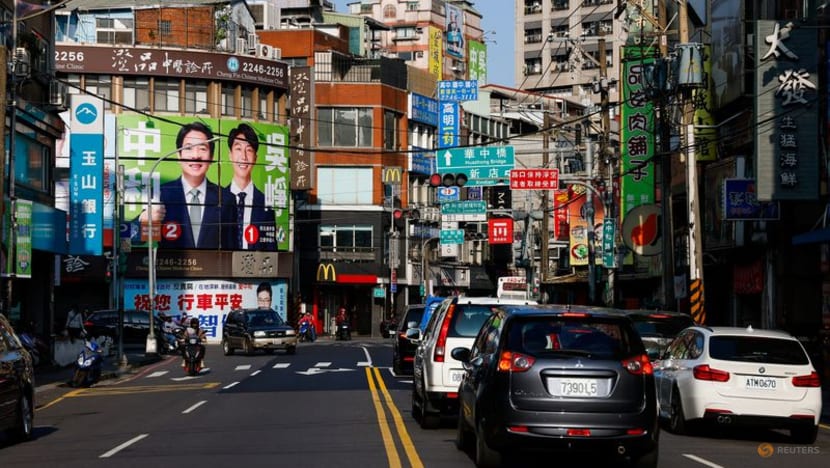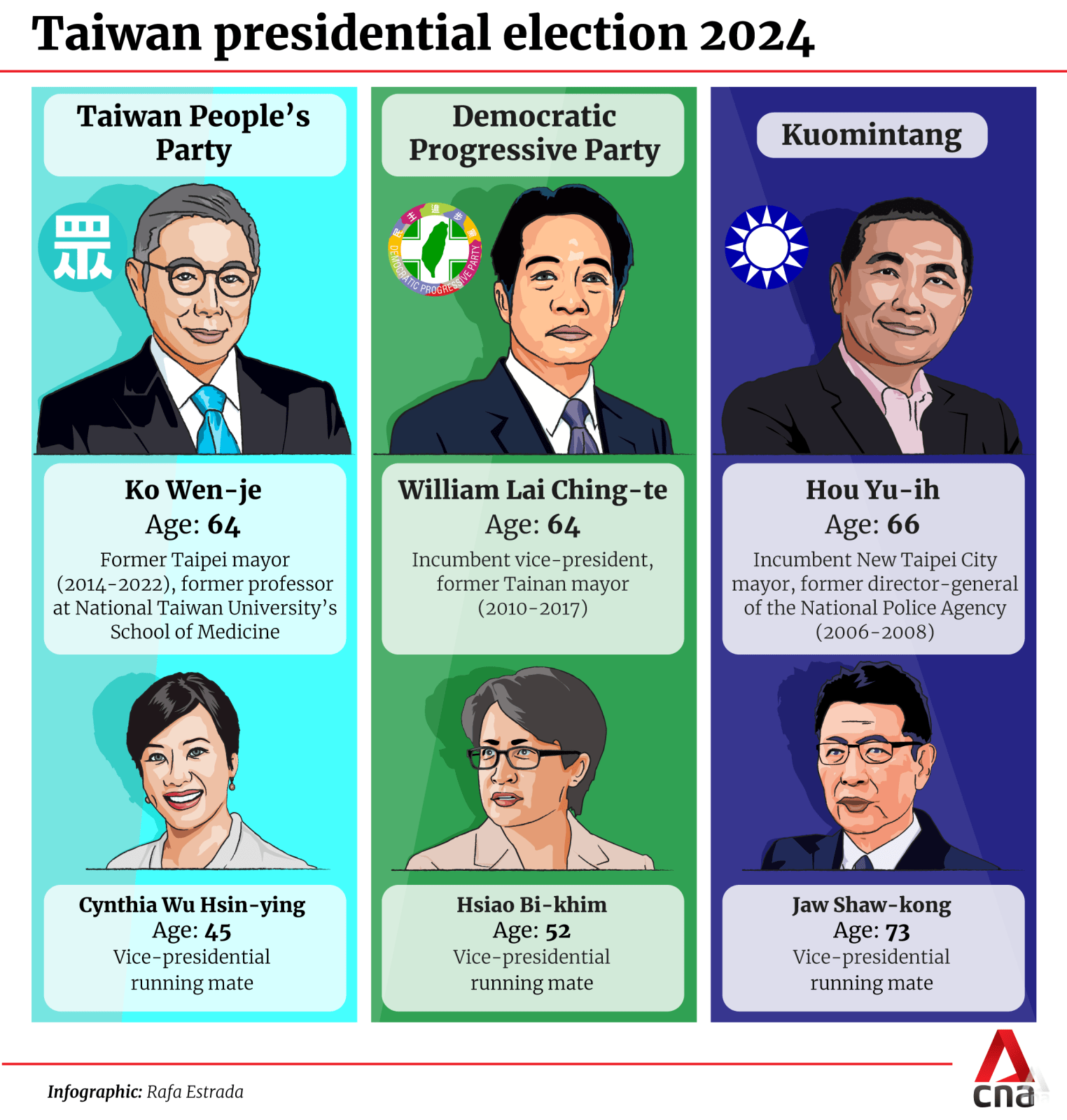Taiwan Votes 2024: Outcome of presidential race to have broader impact on US-China ties
Mr Hou Yu-ih of the Kuomintang (KMT), China’s preferred contender, has emerged as the main challenger to Democratic Progressive Party (DPP) candidate William Lai.

People ride past a campaign ad for Lai Ching-te, Taiwan's vice president and the ruling Democratic Progressive Party's (DPP) presidential candidate and Justin Wu, local parliament member candidate for the ruling Democratic Progressive Party's (DPP) ahead of the election in Taipei, Taiwan on January 12, 2024. (Photo: Reuters/Ann Wang)

This audio is generated by an AI tool.
WASHINGTON: The White House is not formally backing any candidate or party in Taiwan’s presidential election on Saturday (Jan 13), but the outcome will matter to the United States all the same no matter who wins.
Taiwan remains at the heart of potential disputes between Washington and Beijing, with Chinese President Xi Jinping calling the island “the biggest, most potentially dangerous issue in US-China relations” during a meeting between the leaders last year.
At the Defence Policy Coordination Talks in Washington that ended on Tuesday, Chinese officials urged the US to stop arming Taiwan – which China sees as a breakaway province to be unified with the mainland one day – and to oppose its independence.
The meeting marked the resumption of talks that had frozen after former US House Speaker Nancy Pelosi visited Taiwan in August 2022.
Pentagon officials reaffirmed calls for "peace and stability" across the Taiwan Strait and said Washington is committed to its “one China policy”, under which it recognises and has formal ties with China rather than Taiwan, but also maintains a strong unofficial relationship with the island, including continued arms sales so that it can defend itself.
US-TAIWAN TIES
The US still sees Taiwan as a strategic, economic and security partner, and maintains what it calls a "robust" relationship with the island.
This includes arms sales worth some US$4 billion in the past two years, trade totalling an estimated US$160 billion in 2022, and high-level meetings between both sides.
Ms Pelosi’s visit, as well as the meeting between her successor Kevin McCarthy and Taiwanese President Tsai Ing-wen in California months later, had angered China, which responded with extensive military drills.
However, there is a chance that relations between the US and Taiwan could shift following the election, observers said.

Mr Hou Yu-ih of the Kuomintang (KMT), China’s preferred contender, has emerged as the main challenger to the ruling Democratic Progressive Party (DPP) candidate William Lai, who wishes to continue the incumbent president’s foreign policy.
The other candidate they will face is former Taipei mayor Ko Wen-je of the small Taiwan People's Party (TPP), only founded in 2019.
Despite KMT and TPP failing to agree on the terms of a coalition for a joint presidential bid, both sides concurred that Taiwan needs a change of government after eight years of DPP rule.
Mr Hou introduced a '3D' cross-strait policy - deterrence, dialogue, de-escalation. Similarly, Mr Ko advocates deterrence and an increase in military budget to 3 per cent of the island's gross domestic product (GDP).
Cross-strait relations have been on a decline since Ms Tsai’s pro-independence DPP came to power in 2016.
"The biggest thing that US policymakers worry about is that Taiwan will flip suddenly and we will find ourselves looking at Taiwan which has either been enticed into a much closer relationship with the PRC (People’s Republic of China), or it will be coerced into a much closer relationship with Beijing,” said Professor Shelley Rigger from Davidson College in North Carolina, who specialises in Taiwanese politics and on the relationships among the US, China and Taiwan.
But in a region so volatile, charged and sensitive, any result may leave US-China ties once again fraught, cautioned Prof Rigger.
"My expectation would be that if the KMT wins, the PRC will perceive that to have happened in spite of the United States. If the DPP wins, the PRC will perceive that to have happened with the connivance of the United States. So either way, the US is somehow in the doghouse whatever the outcome may be,” she said.
POTENTIAL CHANGES FOLLOWING ELECTION
However, senior political scientist Raymond Kuo, director of Taiwan Policy Initiative at Washington-based think tank RAND Corporation, said that even if the KMT wins, it will be difficult to unwind the progress that the DPP has made with the US in terms of security cooperation and military acquisition.
“These run on multi-year timeframes, they don't turn on a dime with a new leadership,” he told CNA's Asia First on Thursday.
He added that the Taiwanese public will also be a barrier to a potential Hou administration forming closer relations with China.
As of last year, about 63 per cent of Taiwanese people identified as Taiwanese only, according to a survey conducted by the Election Study Center in Taiwan’s National Chengchi University.
In contrast, 2.5 per cent identified as Chinese, while around 30 per cent identified as Taiwanese-Chinese.
The research body has been conducting the survey annually since 1992.
“There's a limit to how far the Hou administration can go in developing those economic relations with China,” he said.
Mr Kuo added that if the DPP wins the election, it has a safeguard in the party’s pick for vice-president - former de-facto Taiwan ambassador to the US Hsiao Bi-khim.
“With her in the vice presidency, and a fairly deep bench within the Ministry of Foreign Affairs, Taiwan is going to be able to navigate, at least its relationship with the United States, particularly well. And that's important because it will offset an almost inevitable deterioration in relations between China and Taiwan,” he said.
















